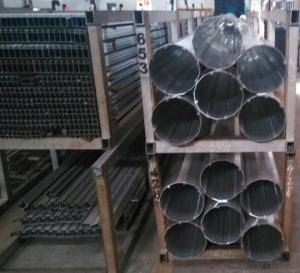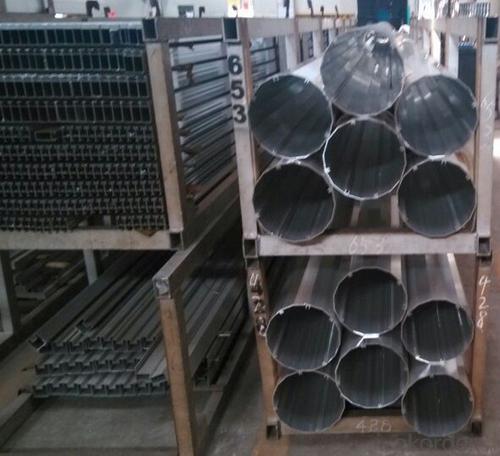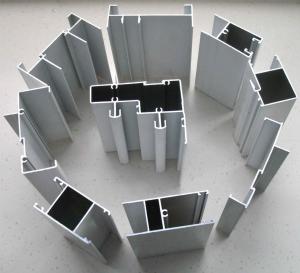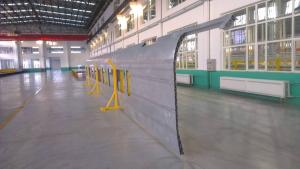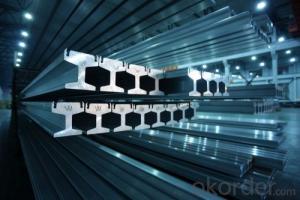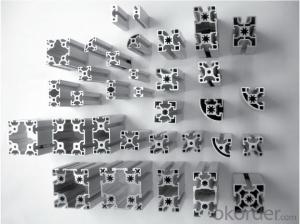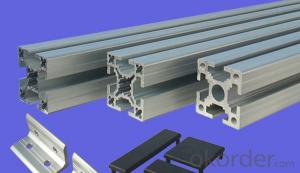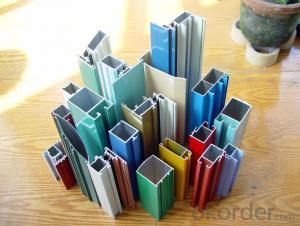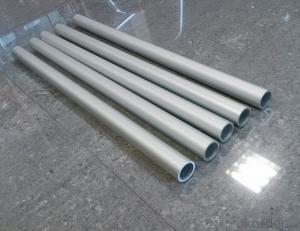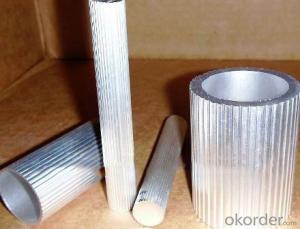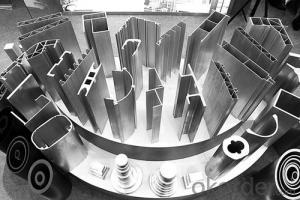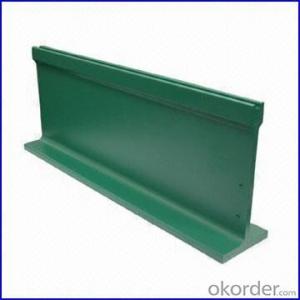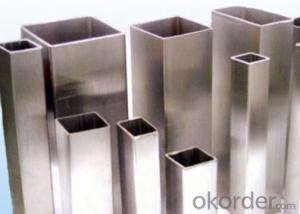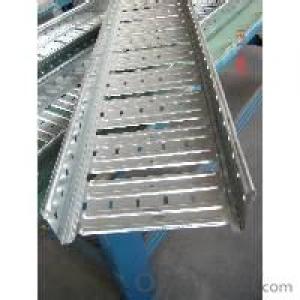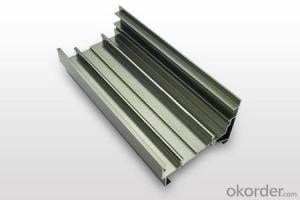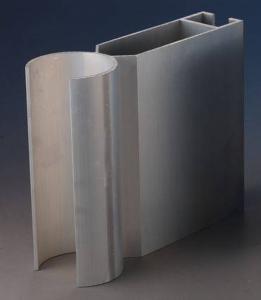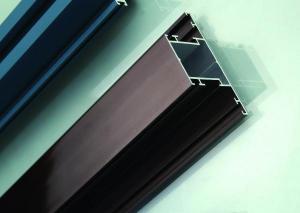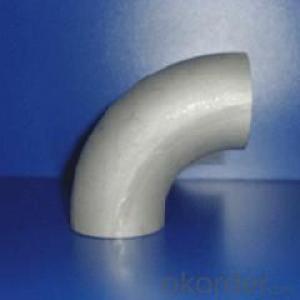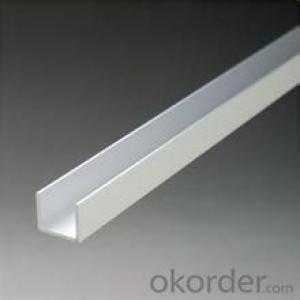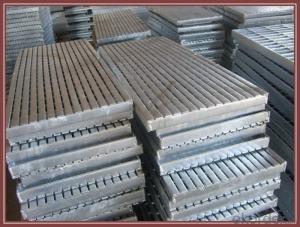Aluminum Extrusion Profiles California - Aluminium Round Tubes for Industrial Application
- Loading Port:
- Shanghai
- Payment Terms:
- TT OR LC
- Min Order Qty:
- 5 m.t.
- Supply Capability:
- 1000 m.t./month
OKorder Service Pledge
OKorder Financial Service
You Might Also Like
Name:aluminum tube&aluminum pipe
Material | 1000series,2000series,3000series.... |
Temper | T4,T5,T6 |
ISO Certificate | ISO9001:2008,SGS |
Size | The size are available in accordance with customers' options. |
Mill finish, Powder Coating, Anodizing, Sandblasting Anodizing, | |
Surface Processing | Cataphoresis, Sandblasting Cataphoresis, Wooden Print etc. |
Shape | round pipe |
Use | Building,Machine,Decoration,etc |
Color | Silver,Golden,Black,Red,Blue a,etc |
Packing: | Export sea worthy package |
Delivery: | Within 30 days after receiving 30%T/T of deposit or L/C |
MOQ: | 1 Metric Ton/Metric Tons |
Price terms: | FOB, CFR, CIF |
Payment terms: | T/T, L/C |
Application | aluminum pipe applies to Structural use ,roofing, commercial use, household appliance, industry, family etc |
Quality control: | a)Mill Test Certificate is supplied with shipment. b)Third party inspection is highly welcomed. |
- Q: Are aluminum profiles suitable for use in sustainable or eco-friendly construction projects?
- <p>Yes, aluminum profiles can be used for green building projects. They are valued for their recyclability, which contributes to sustainability. Aluminum is lightweight, strong, and requires less energy to produce and transport compared to other materials like steel. Additionally, aluminum's durability can lead to a longer lifespan, reducing the need for frequent replacements and thus minimizing waste. Moreover, aluminum can be used in energy-efficient designs, such as in window frames that provide better insulation, further enhancing the green credentials of a building.</p>
- Q: What are the advantages of using aluminum profiles in the oil and gas industry?
- Using aluminum profiles in the oil and gas industry offers numerous benefits. First and foremost, aluminum profiles boast an exceptional strength-to-weight ratio. This means they provide excellent structural integrity while remaining lightweight, a crucial factor when transporting and installing equipment in different locations. Moreover, the lightweight nature of aluminum profiles reduces the strain on structures and equipment, resulting in energy savings and enhanced efficiency. Secondly, aluminum profiles exhibit remarkable resistance to corrosion. Given that the oil and gas industry often operates in harsh environments with exposure to saltwater, chemicals, and extreme temperatures, the natural oxide layer of aluminum acts as a protective barrier, ensuring durability and preventing corrosion. This corrosion resistance significantly reduces maintenance and replacement costs throughout the equipment's lifespan. Furthermore, aluminum profiles are non-magnetic, making them ideal for applications where magnetic interference is a concern. In the oil and gas industry, precision and accuracy are paramount, and the non-magnetic properties of aluminum profiles ensure that equipment operates without any electromagnetic interference, guaranteeing data accuracy and reliable performance. Additionally, aluminum profiles can be easily fabricated and customized to meet specific requirements. They can be extruded into various shapes, sizes, and configurations, providing endless design possibilities. This manufacturing flexibility makes aluminum profiles highly versatile, allowing them to be utilized in a wide range of applications within the oil and gas industry, such as pipe racks, platforms, support structures, and access systems. Lastly, aluminum is an environmentally friendly and sustainable material. It is 100% recyclable without losing its properties, making it an ideal choice for the oil and gas industry, which increasingly focuses on reducing its carbon footprint. The recyclability of aluminum also contributes to cost savings and resource conservation. In conclusion, the advantages of using aluminum profiles in the oil and gas industry encompass their high strength-to-weight ratio, corrosion resistance, non-magnetic properties, easy fabrication, and recyclability. These characteristics make aluminum profiles a dependable and cost-effective solution for various applications within this industry.
- Q: What are the industries that require aluminum profiles in industry?
- 1, transportation (including automobile manufacturing, rail transportation).2 equipment and machinery manufacturing.3) durable consumer goods (including light industries).4, transportation, equipment and machinery and equipment manufacturing, durable consumer goods industry, respectively, in China's aluminum profile applications accounted for about 10%, 10% and 12%. While in Europe, North America and Japan aluminum consumption structure, industrial consumption ratio reached 60%, 55% and 40%, much higher than in China. It is expected in the next 5~10 years, China's consumption of aluminum industry will continue to grow in the aluminum products in the proportion of about 30% up to 2015 about 45~50%.5, aluminum plating process, which belongs to the coating technology it is pre plating and electroplating process steps to increase on the basis of conventional Ti process, aluminum is the process of the aqueous solution of salt and hydrochloric acid in the plating after activation of chemical treatment; electroplating bath composition including sulfur acid nickel, nickel chloride, boric acid twelve, sodium lauryl sulfate, saccharin, brightener, this process has the advantages of simple, practical and good effect, the titanium aluminum prepared by the hardness of the film is HV 1500, under the same conditions than the 22 carat gold plating wear 150 times, can be processed into various forms, golden color, black and bright various series of aluminum products.
- Q: This question asks for a method to calculate the quantity of aluminum profiles required for a construction project.
- <p>To calculate the amount of aluminum profiles needed for your building project, first, measure the dimensions of the area where the profiles will be used. Determine the length and width of each profile required. Multiply these dimensions by the number of profiles needed for each section of the project. Add up the totals for all sections to get the overall quantity. Consider the type of profile and its application, as this will affect the quantity and specification. Factor in a small percentage for waste and cutting errors. For complex projects, consult with an engineer or use specialized software to ensure accuracy.</p>
- Q: Is it possible to use aluminum profiles for outdoor applications like fences and railings?
- <p>Yes, aluminum profiles are commonly used for outdoor applications such as fences and railings. They are favored for their resistance to corrosion, lightweight properties, and durability. Aluminum can withstand harsh weather conditions without rusting, making it an ideal material for outdoor use. Additionally, it is low maintenance, as it does not require painting or frequent repairs. The profiles can be powder-coated or anodized for enhanced protection and aesthetic appeal.</p>
- Q: This question asks for guidance on selecting the appropriate aluminum profile for a construction project.
- <p>To choose a suitable aluminum profile for your building project, consider the following: First, assess the structural requirements such as load-bearing capacity and span. Second, consider the aesthetic preferences and the desired finish or color. Third, evaluate the environmental conditions the profile will be exposed to, such as weather resistance and corrosion. Fourth, consult with suppliers or manufacturers for technical specifications and recommendations. Fifth, ensure compliance with building codes and standards. Finally, factor in the cost and availability of the profiles. It's often helpful to consult with engineers or architects who can provide expert advice tailored to your specific project needs.</p>
- Q: How to process the wood grain transfer of aluminum profile? Thank you
- Popular talk is to transfer grain, electrostatic powder coating on metal material, vacuum equipment through the wood grain transfer on the coating material in high temperature, pay pressure, ink sublimation transfer printing or transfer film on the penetration into a conversion process in the coating. Now there are very good equipment in China ~!
- Q: How do you attach accessories or components to aluminum profiles?
- Attaching accessories or components to aluminum profiles can be done in multiple ways. One commonly used technique involves the use of T-slot nuts and bolts. T-slot nuts can easily slide into the T-slot groove on the profile and can be placed at any desired location along its length. Subsequently, the bolts are utilized to firmly secure the accessory or component to the nut, establishing a sturdy and dependable connection. Another alternative is to employ brackets or mounting plates that are specifically designed for aluminum profiles. These brackets generally possess pre-drilled holes that align perfectly with the T-slot grooves, allowing for effortless attachment of accessories. They can be fastened to the profile using screws or bolts. Furthermore, there are various specialized connectors available for specific applications. Examples of these connectors include corner connectors, joining plates, and hinge connectors. These connectors offer convenient and reliable methods to attach accessories or components to aluminum profiles without the necessity of additional drilling or machining. When selecting the attachment method, it is crucial to consider the weight and load-bearing requirements of the accessories or components. Utilizing suitable fasteners and connectors guarantees a secure attachment, preventing any potential hazards.
- Q: Which is the highest price of aluminum profile 60616063?
- 6063 general construction profiles, that is industrial profiles
- Q: Are aluminum profiles suitable for balcony railings?
- Yes, aluminum profiles are suitable for balcony railings. Aluminum is a popular material choice for balcony railings due to its durability, strength, and low maintenance requirements. It is resistant to rust and corrosion, making it highly suitable for outdoor use. Additionally, aluminum profiles can be easily customized and shaped to fit any design preference or architectural style. They are lightweight, yet sturdy enough to provide the necessary support and safety for balcony railings. Aluminum railings are also available in a variety of finishes and colors, allowing for endless design possibilities. Overall, aluminum profiles are a reliable and stylish option for balcony railings.
Send your message to us
Aluminum Extrusion Profiles California - Aluminium Round Tubes for Industrial Application
- Loading Port:
- Shanghai
- Payment Terms:
- TT OR LC
- Min Order Qty:
- 5 m.t.
- Supply Capability:
- 1000 m.t./month
OKorder Service Pledge
OKorder Financial Service
Similar products
Hot products
Hot Searches
Related keywords
